
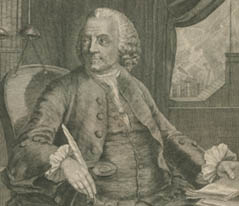
Francois Nicolas Martinet, engraved frontispiece, after the painting by Mason Chamberlin, in Oeuvres de M. Franklin, Paris, 1773.
Section 6: Inventing Poor Richard
After The Pennsylvania Gazette, Poor Richard was the most profitable enterprise that Franklin undertook as a publisher. It sold about 10,000 copies a year. Given the now indissoluble connection between “Poor Richard” and Benjamin Franklin, it should be emphasized that most of the material in Poor Richard was not actually written by Franklin. This was especially true of the aphorisms, their most famous feature. Franklin could have had no idea that the brief sayings he used, taken from “many Ages and Nations,” would become the primary basis for his international fame as an author. He never pretended they were his own. He wrote in Poor Richard for 1746,
“I know as well as thee, that I am no poet born; and it is a trade I never learnt, nor indeed could learn. . . .Why then should I give my readers bad lines of my own, when good ones of other people’s are so plenty? ’Tis methinks a poor excuse for the bad entertainment of guests, that the food we set before them, though coarse and ordinary, is of one’s own raising, off one’s own plantation, etc. when there is plenty of what is ten times better, to be had in the market.”
Intellectual property, the ownership of ideas, was not what mattered. The point was not where the ideas had come from but the uses to which they could be put.
In 1732 I first published my Almanack, under the name of Richard Saunders; it was continu’d by me about 25 Years, commonly call’d Poor Richard’s Almanack. I endeavor’d to make it both entertaining and useful, and it accordingly came to be in such Demand that I reap’d considerable Profit from it, vending annually near ten Thousand. . . . I consider’d it as a proper Vehicle for conveying Instruction among the common People, who bought scarcely any other Books. I therefore filled all the little Spaces that occur’d between the Remarkable Days in the Calendar, with Proverbial Sentences, chiefly such as inculcated Industry and Frugality, as the Means of procuring Wealth and thereby securing Virtue, it being more difficult for a Man in Want to act always honestly, as (to use here one of those Proverbs) it is hard for an empty Sack to stand upright.
Benjamin Franklin, Autobiography
![[Benjamin Franklin], Poor Richard, 1733. Almanack For the Year of Christ 1733 (Philadelphia: Printed and Sold by B. Franklin, [1733]). Historical Society of Pennsylvania.](images/thumbs/th6.1.jpg) [Benjamin Franklin], Poor Richard, 1733. Almanack For the Year of Christ 1733 (Philadelphia: Printed and Sold by B. Franklin, [1733]). Historical Society of Pennsylvania.
[Benjamin Franklin], Poor Richard, 1733. Almanack For the Year of Christ 1733 (Philadelphia: Printed and Sold by B. Franklin, [1733]). Historical Society of Pennsylvania.
The first Poor Richard was so successful that Franklin printed three impressions from December 1732 to January 1733. This is the only known copy of the third.
Richard Saunder [sic]. 1720. Apollo Anglicanus: The English Apollo (London: Printed by J. Wilde, for the Company of Stationers, 1720). Historical Society of Pennsylvania.
(left image)
Poor Robin. 1731. A New Almanack (London: Printed by W. Bowyer for the Company of Stationers, 1731). (right image)
Franklin got the name Richard Saunders from an English almanac that first appeared in 1654; the nickname “Poor Richard” echoed another popular British almanac, Poor Robin, which first appeared in 1664.
![[Benjamin Franklin], Poor Richard improved: Being an Almanack and Ephemeris . . . for . . . 1748 (Philadelphia: Printed and sold by B. Franklin, [1747]).](images/thumbs/th6.4.jpg) [Benjamin Franklin], Poor Richard improved: Being an Almanack and Ephemeris . . . for . . . 1748 (Philadelphia: Printed and sold by B. Franklin, [1747]).
[Benjamin Franklin], Poor Richard improved: Being an Almanack and Ephemeris . . . for . . . 1748 (Philadelphia: Printed and sold by B. Franklin, [1747]).
Most almanacs were sold locally, but the “improved” Poor Richard for 1748 was the first to be issued in three versions tailored to New England, the Middle Colonies, and the South. This copy is the Southern version, with information on courts in Virginia and the Carolinas.
[James Burgh], An Hymn to the Creator of the World (London: Printed and Sold by M. Cooper, 1750). The copy owned by Franklin. Historical Society of Pennsylvania.
[Benjamin Franklin], Poor Richard improved . . . for 1753 (Philadelphia: Printed and Sold by B. Franklin, and D. Hall. [1752]).
Poor Richard, like all other almanacs, was a miscellany. Franklin took material from a wide variety of sources. Here is his own copy of a book by the British philosopher James Burgh, large parts of which he copied verbatim in the 1753 Poor Richard. We know he set his type directly from this book, because it is marked up in his own hand. At one point he disagreed with Burgh about the nature of sun-spots, and so he took up his pen and altered the text to bring it into line with his own views. The change was printed without comment in Poor Richard.
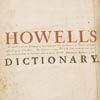 James Howell, Lexicon Tetraglotton, an English-French-Italian-Spanish Dictionary, wereunto is adjoined . . . the choicest proverbs in all the said toungs (London: Printed by J.G. for Cornelius Bee, 1660). Isaac Norris’s copy.
James Howell, Lexicon Tetraglotton, an English-French-Italian-Spanish Dictionary, wereunto is adjoined . . . the choicest proverbs in all the said toungs (London: Printed by J.G. for Cornelius Bee, 1660). Isaac Norris’s copy.
Franklin almost certainly borrowed this copy of Howell’s Lexicon Tetraglotton from Isaac Norris and mined it for epigrams that appeared in Poor Richard from 1734 to 1742.
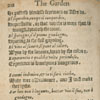 Lodovico Guicciardini, Houres of Recreation, or Afterdinners, which may aptly be called The Garden of Pleasure, second edition, translated by James Sandford (London: Henry Binneman, 1576).
Lodovico Guicciardini, Houres of Recreation, or Afterdinners, which may aptly be called The Garden of Pleasure, second edition, translated by James Sandford (London: Henry Binneman, 1576).
William J. Duane bought this book at the sale of Franklin’s library, noting that it was the source of many of his aphorisms. For example, Franklin’s “The Cat in Gloves catches no Mice” (PR, March 1754) is closer to Guicciardini’s “A gloued catte can catche no myse” than to Howell’s “A muffed cat takes no mice.”
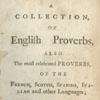 Thomas Fuller, A Collection of English Proverbs (London, 1732).
Thomas Fuller, A Collection of English Proverbs (London, 1732).Books imported from England furnished Franklin with most of the seemingly homespun wisdom of Poor Richard. This was his main source for proverbs from 1745 to 1751, including his famous ‘Little stroaks fell great oaks’ (PR, August 1750).
Proverbs
Franklin drew extensively on proverbs that praised virtue and industry, but he was not uncritical of the relation between them. Virtue was easier for the rich than the poor. To make that point, Poor Richard in 1740 quoted nearly verbatim from a well-known book of proverbs: “An empty Bag cannot stand upright.” In the 1750 almanac Franklin rewrote this proverb, expanding it from six words to 24, not in order to improve it but to fill an available space. He recycled it again in the preface to his 1758 almanac, which was itself recycled endlessly as The Way to Wealth. Finally he returned to it at the end of his life in the third part of his autobiography, in the passage quoted above, as an example of how he used proverbs in his almanacs.
![[Benjamin Franklin], Poor Richard, 1740 (Philadelphia: Printed and sold by B. Franklin, [1739]).](images/thumbs/th6.12.jpg)
[Benjamin Franklin], Poor Richard, 1740 (Philadelphia: Printed and sold by B. Franklin, [1739]).
Modern editions give little sense of what it was like to read these sayings in their original setting, interspersed among the astronomical observations. It is a challenge to find the proverb on this page: “An empty Bag cannot stand upright.” Franklin often had to abridge or expand sayings to fit them into the available space. He was not the first to hide his proverbs this way, but he cleverly used this technical constraint as a spur to his invention.
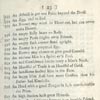 Thomas Fuller, A Collection of Englsh Proverbs (London 1732)
Thomas Fuller, A Collection of Englsh Proverbs (London 1732)
“An empty Sack cannot stand upright.” Franklin’s source.
![[Benjamin Franklin], Poor Richard, 1740 (Philadelphia: Printed and sold by B. Franklin, [1739]).](images/thumbs/th6.12.jpg) [Benjamin Franklin], Poor Richard, 1740 (Philadelphia: Printed and sold by B. Franklin, [1739]).
[Benjamin Franklin], Poor Richard, 1740 (Philadelphia: Printed and sold by B. Franklin, [1739]).
“An empty Bag cannot stand upright.” Franklin substituted “Bag” for “Sack.”
![[Benjamin Franklin], Poor Richard Improved … for 1750 (Philadelphia: Printed and Sold by B. Franklin and D. Hall, [1749]).](images/thumbs/th6.11.jpg) [Benjamin Franklin], Poor Richard Improved … for 1750 (Philadelphia: Printed and Sold by B. Franklin and D. Hall, [1749]).
[Benjamin Franklin], Poor Richard Improved … for 1750 (Philadelphia: Printed and Sold by B. Franklin and D. Hall, [1749]).
“’Tis hard (but glorious) to be poor and honest. An empty Sack can hardly stand upright; but if it does, ‘tis a stout one!” With more space to fill, Franklin unpacked the proverb, while also restoring Fuller’s “Sack” in place of his own “Bag.”
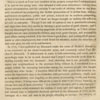 Benjamin Franklin, Memoirs of the Life and writings of Benjamin Franklin (London: Printed for Henry Colburn, British and Foreign Public Library, 1818).
Benjamin Franklin, Memoirs of the Life and writings of Benjamin Franklin (London: Printed for Henry Colburn, British and Foreign Public Library, 1818).
It is “more difficult for a Man in Want to act always honestly, as (to use here one of those Proverbs [from Poor Richard]) it is hard for an empty Sack to stand upright.” He returned again to the proverb in his autobiography.
![Richard Saunder [sic]. 1720. Apollo Anglicanus: The English Apollo (London: Printed by J. Wilde, for the Company of Stationers, 1720). Historical Society of Pennsylvania.](images/thumbs/th6.2.jpg)
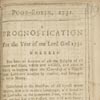
![[James Burgh], An Hymn to the Creator of the World (London: Printed and Sold by M. Cooper, 1750). The copy owned by Franklin. Historical Society of Pennsylvania.](images/thumbs/th6.5.jpg)
![[Benjamin Franklin], Poor Richard improved . . . for 1753 (Philadelphia: Printed and Sold by B. Franklin, and D. Hall. [1752]).](images/thumbs/th6.6.jpg)